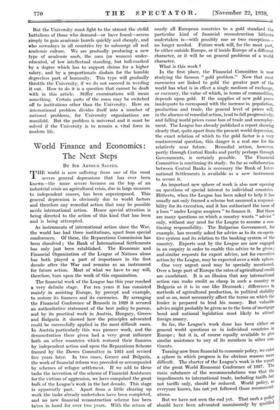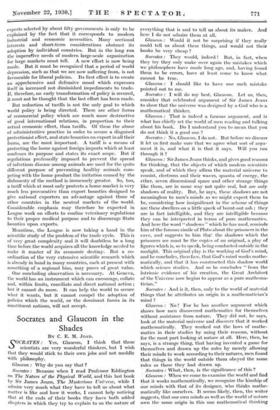World Finance and Economics : The Next Steps
BY SIR ARTHUR SALTER.
rpHE world is now suffering from one of the most -I- severe general depressions that has ever been known—the more severe because on the top of an industrial crisis an agricultural crisis, due in large measure to independent causes, has been superimposed. This general depression is obviously due to world factors and therefore any remedial action that may be possible needs international action. Hence special attention is being directed to the action of this kind that has been and is being attempted.
As instruments of international action since the War, the world has had three institutions, apart from special conferences. Of these, the Reparations Commission has been dissolved ; the Bank of International Settlements has only just been established. The Economic and Financial Organization of the League of Nations alone has both played a part of importance in the first decade after the War and remains as an instrument for future action. Most of what we have to say will, therefore, turn upon the work of this organization.
The financial work of the League has this year reached a very definite stage. For ten years it has consisted mainly in assisting Europe, by precept and example, to restore its finances and its currencies. By arranging the Financial Conference of Brussels in 1920 it secured an authoritative statement of the best policy to pursue, and by its practical work in Austria, Hungary, Greece and Bulgaria it showed how the principles advocated could be successfully applied in the most difficult cases. In Austria particularly this was pioneer work, and the demonstration there given had a very great influence both on other- countries which restored their finances by independent action and upon the Reparations Scheme framed by the Dawes Committee in 1924 and revised five years later. In two cases, Greece and Bulgaria, the work of financial reform was preceded or accompanied by schemes of refugee settlement. If we add to these tasks the invention of the scheme of Financial Assistance for the victims of aggression, we have comprised the great bulk of the League's work in the last decade. This stage is apparently past. Apart from a little clearing up work the tasks already undertaken have been completed, and no new financial reconstruction scheme has been taken in hand for over two years. With the return of nearly all European countries to a gold standard the particular kind of financial reconstruction hitherto undertaken is—with possibly one or two exceptions-- no -longer needed. Future work will, for the most pert, be either outside Europe, or if inside Europe of a different character, or it will be on general problems of a world character.
What is this work ?
In the first- place, the Financial Committee is now studying the famous " gold problem." Now that most currencies are linked to gold the greater part of the world has what is in effect a single medium of exchange, or currency, the value of which, in terms of commodities, depends upon gold. If the supplies of new gold prove inadequate to correspond with the increase in population, production and trade, the general level of prices will, in the absence of remedial action, tend to fall progressively; and falling world prices cause loss of trade and unemploy- ment. The League has already published a report showing clearly that, quite apart from the present world depression, the exact relation of which to the gold factor is a very controversial question, this danger is a real one for the relatively near future. Remedial action, however, partly through Central Banks and partly perhaps through Governments, is certainly possible. The Financial Committee is continuing its study. So far as collaboration between Central Banks is necessary the Bank of Inter- national Settlements is available as a new instrument to secure it.
An important new sphere of work is also now opening on questions of special interest to individual countries. Hitherto, when the League has been asked to help it has usually not only framed a scheme but assumed a responsi- bility for its execution, and it has authorized the issue of a loan " under League auspices " to finance it. But there are many questions on which a country wants " advice " only. without any need for the League to assume a con- tinuing responsibility. The Bulgarian Government, for example, has recently asked for advice as to its co-opera- tive system and its relation to the banking system of the country. Experts sent by the League are now engaged in an enquiry in order to enable this advice to be given ; and similar requests for expert advice, not for executive action by the League, may be expected over a wide sphere.
One very urgent need may be specially mentioned. Over a large part of Europe the rates of agricultural credit are exorbitant. It is an illusion that any international action can make credit as cheap in such a country as Bulgaria as it is in one like Denmark ; differences in methods of agricultural production, in political stability and so on, must necessarily affect the terms on which the lender is prepared to lend his money. But valuable advice might probably be given as to the form of mortgage bond and national legislatiori most likely to attract foreign money.
So far, the League's work done has been either on general world questions or in individual countries in Europe ; but it is, of course equally available to give similar assistance to any of its members in other con- tinents.
Turning now from financial to economic policy, we enter a sphere in which progress is for obvious reasons more difficult. The charter of the League's work is the report of the great World Economic Conference of 192y. The main substance of the recommendations was that the impediments to international trade, including tariffs but not tariffs only, should be reduced. World policy, as everyone knows, has not yet followed those recommend- ations.
But we have not seen the end yet. That such a policy should have been advocated unanimously by qualified
experts selected by about fifty governments is only to be explained by the fact that it corresponds to modern industrial and economic necessities. Many sectional interests and 'short-term considerations obstruct its adoption by individual countries. But in the long run the imperative needs of modern large-scale organization for large markets must tell. A new effort is now being made. But it must be recognized that a period of world depression, such as that we are now suffering from, is not favourable for liberal policies. Its first effect is to create an apprehensive and defensive mood which expresses itself in increased not diminished impediments to trade. If, therefore, no early transformation of policy is secured, it must not be thought that the last effort has been made. But reduction of tariffs is not the only goal to which world policy is being directed. There are other forms of commercial policy which are much more destructive of good international relations, in proportion to their actual economic effect, than tariffs. Of these the abuse of administrative practice in order to secure a disguised protectionist effect,-and state bounties on export in all their forms, are the most important. A tariff is a means of protecting the home against foreign imports which at least confesses, its purpose and states its exact scope.. But if regulations professedly imposed to prevent the spread of infectious disease among animals are used for the quite different purpose of preventing healthy animals com- peting with the home product the irritation caused by the dishonesty of the method is immensely greater. So, too, a tariff which at most only protects a home market is very much less provocative than export bounties designed to give national exporters an advantage against those of other countries in the neutral markets of the world. Considerable . emphasis may therefore be expected in League work on efforts to confine veterinary regulations to their proper medical purpose and to discourage State
bounties upon .exports. .
Meantime, • the League is now taking a hand in the scientific study of the problem of the trade cycle. This is of very great complexity and it will doubtless be a long time before the world acquires all the knowledge needed to make it master of its economic destiny. But a co- ordination of the very extensive scientific research which is already in hand in many countries, each at present with something of a regional bias, may prove of great value. . One concluding observation is necessary. At Geneva, the world has an instrument which can encourage, collate and, within limits, conciliate and direct national action ; but it cannot do more. It can help the world to secure what it wants, but it cannot compel the adoption of policies which the world, or the dominant forces in its constituent nations, will not accept.



















































































 Previous page
Previous page